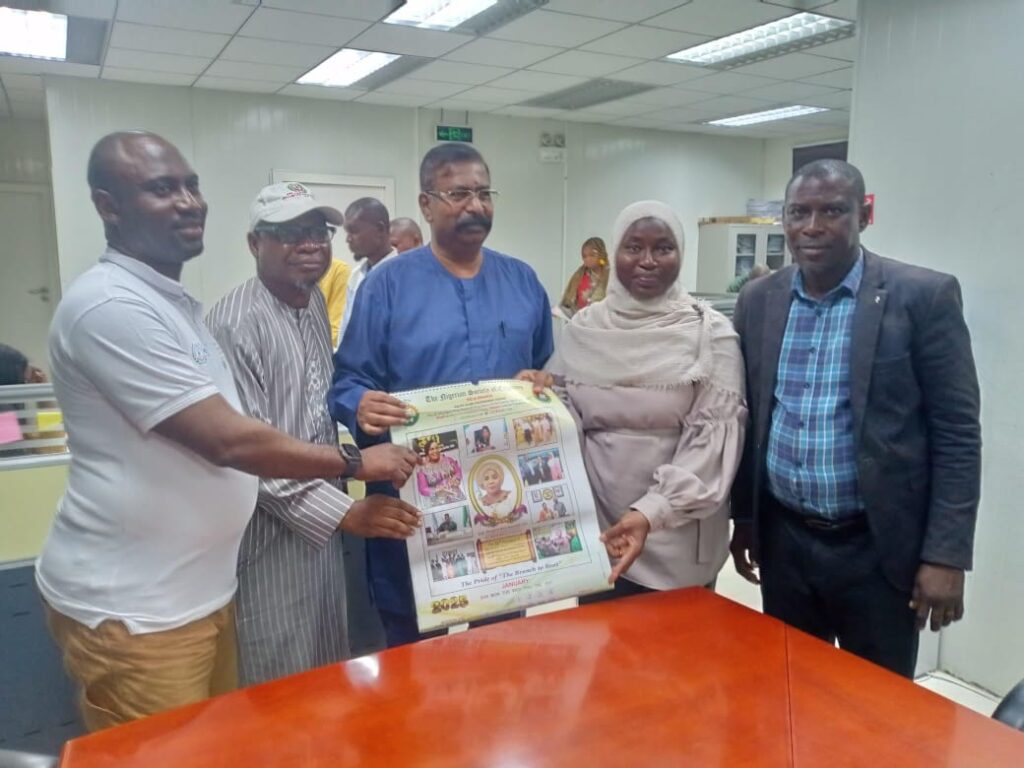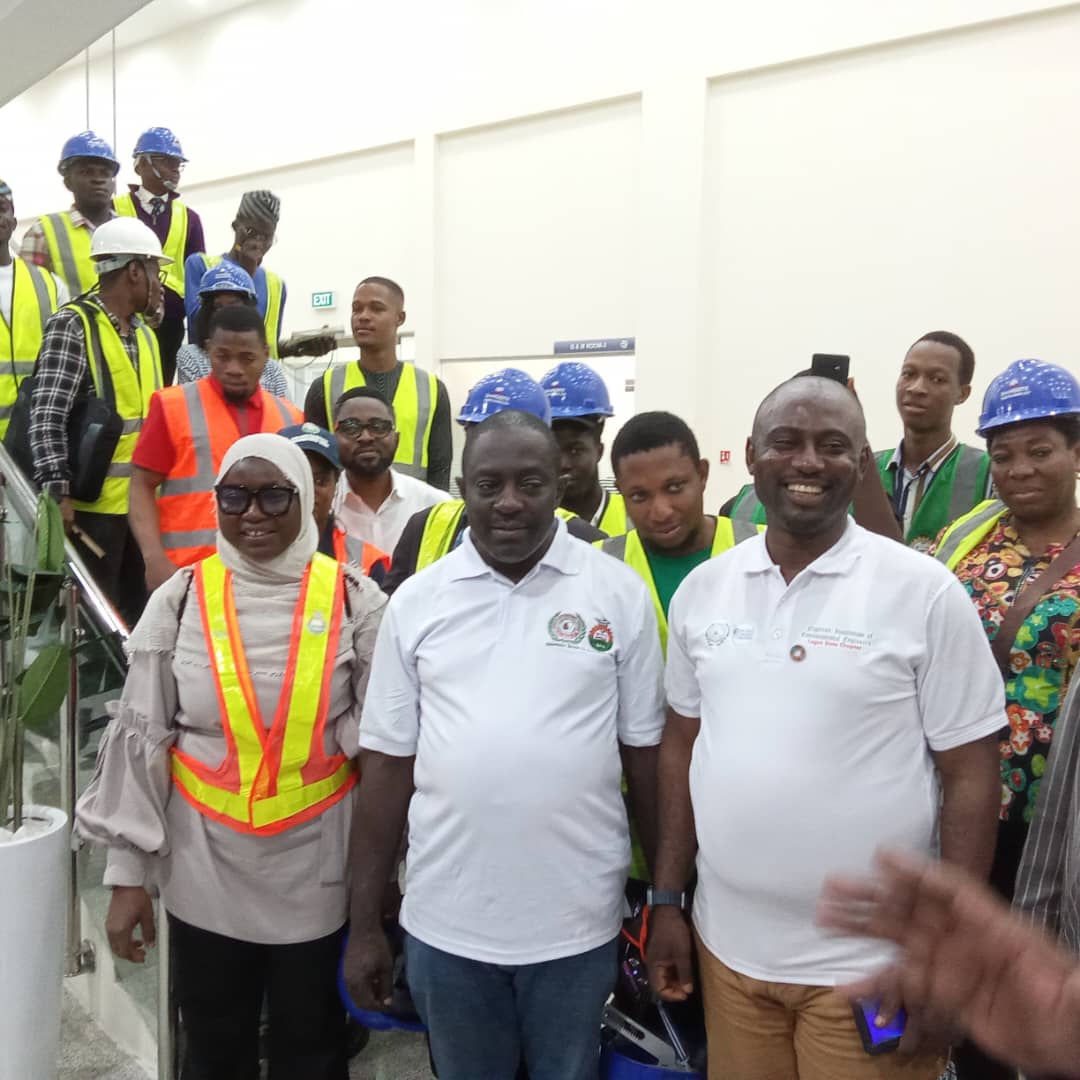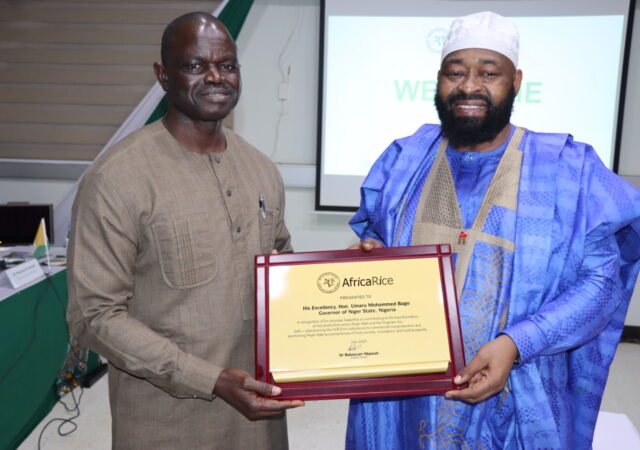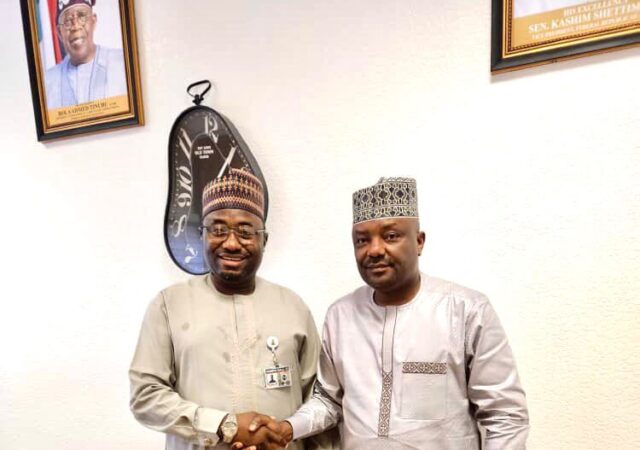L-R: Engr. Nimot Muili, FNSE (Chairman, NSE Ikeja Branch); Engr. Adebayo Adereti (Head, Oil and Gas, Lagos State Ministry of Energy and Mineral Resources); and Engr. Yusuf Majolagbe (Chairman, NIEE Lagos Chapter) during a study tour of the refinery on Wednesday, November 27, 2024, with engineering student members participating in the background.
At the sidelines of a Study Tour of the Dangote Refinery, The Branch Chairman of the Nigerian Society of Engineers (NSE) Ikeja Branch, spoke to Environment Africa on the need for adaptability and continuous knowledge renewal, advocating on the need to foster engineering evolution through learning and relearning to drive increased innovation and growth.
Excerpts
What motivated you to embark on this study tour to the Dangote Refinery?
The primary motivation was the realization that such a monumental project is happening right here in Nigeria. We’ve read extensively about it and followed the discussions about having a private refinery, especially in contrast to the government-operated ones. It’s remarkable that a private individual has been able to bring this vision to life.
From inception to its current operational phase, the journey of the Dangote Refinery is inspiring. The level of engineering involved and the job opportunities already created, and those still to come, are incredible. Despite the challenges, this private organization has successfully demonstrated that Nigerians are technically capable, collaborative, and capable of delivering a project of this scale.
What are your impressions of the HSSE practices and the engineering process optimization at the refinery?
My initial expectations have been greatly exceeded. Often, when projects are localized, they might compromise on standards, but this refinery is a local initiative that meets international benchmarks. It’s impressive to see practices here that mirror those implemented globally; and even exceed them.
The HSSE measures in place are outstanding. During my speech, I mentioned the importance of unlearning some conventional practices to adopt new methodologies. What we’ve seen and learned here reflects cutting-edge global practices tailored to local conditions.

For example, I questioned the presence of gas flaring at a new refinery, and they provided a detailed explanation of its necessity within this context. The attention and commitment not just to enable international standards but to exceed them is truly commendable.
I mean, it’s really motivating so that when we talk to people and investors; we talk about the ease of doing business. If this is happening, then we should be able to attract more investors, create more employment opportunities and investment opportunities as well.
What are your thoughts on engineering knowledge and capacity building, particularly for students and even established professionals?
The impact on engineering knowledge and capacity development is significant. Thousands of students and young engineers have already been engaged, with many gaining hands-on experience through short-term internships or tours like this one. These experiences bridge the gap between theoretical learning and practical application.
For students, it’s transformative to see concepts from their coursework, like hydrocarbon cracking and exploration, applied in real life. As someone who isn’t a chemical engineer, even I found the industrial tour enlightening and memorable. This exposure helps solidify their understanding and inspires them to pursue innovation in their careers.
For young engineers, there’s an opportunity to build on these experiences through future collaborations and visits. Seeing processes that aren’t yet fully operational will help them understand how technologies like carbon capture for urea production or CO2 utilization work in practice.
Even for senior engineers and retirees, this tour offers a chance to learn about new technologies and compare them to older methods. It’s a continuous learning process that benefits every cadre of engineering professionals.
What opportunities do you see for further collaboration and local content development?
This project underscores the value of local content and the inclusion of Nigerian engineers in world-class projects. Witnessing local engineers working on-site is inspiring. It’s one thing to hear about their involvement; it’s another to see it firsthand.
Moving forward, there’s potential to deepen collaboration with the Dangote Refinery team and explore partnerships with other investors. This could range from job creation to providing specialized services.
For the Nigerian engineering community, this is a platform to showcase our capabilities, attract investors, and foster opportunities for growth. The refinery demonstrates that we can meet international standards while leveraging local talent, and this success story can serve as a blueprint for future projects.
What’s your take on the impact of the refinery on Nigeria’s local engineering capacity?
This industrial tour has been a remarkable learning experience. It’s not just about what the country can offer us, but also about what we can contribute to its growth. We leave with a renewed sense of pride and the determination to promote Nigeria’s engineering potential to the world.
The Dangote Refinery stands as a beacon of what is possible when vision, collaboration, and commitment come together.








F*ckin’ tremendous issues here. I’m very satisfied to peer your post. Thank you so much and i am looking ahead to touch you. Will you please drop me a mail?
Хотите [url=https://krs.sushi-holl.ru/catalog/rolly]заказать роллы в красноярске с бесплатной доставкой на дом[/url] быстро и вкусно? Бренд sushi-holl предлагает вам отведать изысканными блюдами японской кухни. В нашем каталоге блюд вы откроете для себя свежие суши, аппетитные роллы и специальные сеты для всех ситуаций – от небольшого застолья до шумного праздника. Мы используем только качественные ингредиенты и готовим блюда по вашему заказу, чтобы они удивляли вас своим вкусом. Оперативная доставка и удобный сервис делают процесс заказа максимально комфортным.
Попробуйте любимую [url=https://krs.sushi-holl.ru/catalog/rolly]заказ суши красноярск с доставкой[/url] от sushi-holl! Мы предлагаем многочисленные комбинации: с цыплёнком, свининой, морепродуктами и овощами. А необычные соусы придают каждому блюду особенный аромат. WOK – это прекрасный вариант для тех, кто ценит питательные и аппетитные блюда. Заказ можно сделать в несколько кликов, и уже в ближайшее время горячая лапша будет у вас на столе. Не упустите возможность заказать известной азиатской кухней, не выходя из дома.
Мы стараемся о своих клиентах, предлагая не только качественные позиции, но и отличное обслуживание. Мы регулярно добавляем специальные предложения и выгодные наборы, чтобы ваш заказ был доступнее. Насладитесь японской и азиатской кухней с sushi-holl – просто, оперативно и гарантированно свежо!
Планируете поездку на Байкал? На сайте туры-на-байкал.рф вы обнаружите всё необходимое для прекрасного отдыха. У нас доступно более 75 предложений отдыха, включая интересные [url=https://xn—–7kcbae1dikm5axn7i.xn--p1ai/]экскурсии на байкал[/url] для любого. Наш интуитивно понятный сервис даёт возможность быстро выбрать подходящее предложение, будь то короткая экскурсия или развернутый отдых на неделю. Вы легко сможете найти туры на разный бюджет — от бюджетных туров до эксклюзивных предложений полный пакет.
Ищете увлекательные [url=https://xn—–7kcbae1dikm5axn7i.xn--p1ai/search-tours/tury-vyhodnogo-dnya]однодневные экскурсии на байкал из иркутска[/url] – мы подготовили неповторимые экскурсии, которые включают прогулки по уникальным пейзажам, катание на ледяной глади, посещение островов и другие необычные развлечения. Зимой вас ждут снежные виды, прогулки по прозрачному льду и езды на собачьих упряжках, а летом — водные прогулки и экскурсии к главным достопримечательностям. Наши туры подходят как для семейного отдыха, так и для парных поездок или корпоративных мероприятий.
Наша группа специалистов гарантирует, что отдых будет подготовлен на лучших условиях. Мы заботимся о каждом клиенте и предлагаем только качественные варианты. Планировать поездку с нами очень легко: воспользуйтесь интуитивно понятный интерфейс сайта, чтобы выбрать тур мечты. Ваш Байкал готов к вашему приезду!
Хотите [url=https://krs.sushi-holl.ru/catalog/khity-prodazh]суши где заказать самые вкусные красноярск[/url] оперативно и качественно? Бренд sushi-holl зовёт вас отведать изысканными блюдами японской кухни. В нашем меню вы сможете заказать свежие суши, аппетитные роллы и удобные сеты для разных поводов – от уютного ужина до шумного праздника. Мы используем только свежие продукты и готовим блюда сразу после заказа, чтобы они восхищали вас своим вкусом. Быстрая доставка и понятный интерфейс делают процесс заказа максимально комфортным.
Попробуйте популярную [url=https://krs.sushi-holl.ru/catalog/rolly]суши доставка красноярск[/url] от sushi-holl! Мы готовим многочисленные комбинации: с цыплёнком, мясом, даровами моря и овощными добавками. А утонченные соусы добавляют каждому блюду яркость вкуса. WOK – это прекрасный вариант для тех, кто предпочитает насыщенные и насыщенные блюда. Заказ можно подать через сайт, и уже совсем скоро ваш заказ будет у вас на столе. Не забудьте насладиться популярной азиатской кухней, не выходя из дома.
Мы думаем о своих клиентах, обеспечивая не только качественные позиции, но и отличное обслуживание. Мы постоянно обновляем акции и выгодные комплекты, чтобы ваш заказ радовал ценой. Насладитесь японской и азиатской кухней с sushi-holl – легко, быстро и невероятно вкусно!
Ищете возможность [url=https://krs.sushi-holl.ru/]суши заказать с доставкой красноярск советский район[/url] быстро и вкусно? Бренд sushi-holl зовёт вас насладиться восхитительными блюдами японской кухни. В нашем меню вы сможете заказать свежие суши, сочные роллы и выгодные сеты для всех ситуаций – от уютного ужина до торжественного мероприятия. Мы готовим из только качественные ингредиенты и готовим блюда по вашему заказу, чтобы они восхищали вас своим вкусом. Быстрая доставка и удобный сервис делают процесс заказа простым и удобным.
Попробуйте популярную [url=https://krs.sushi-holl.ru/catalog/rolly]роллы купить красноярск[/url] от sushi-holl! Мы собрали для вас многочисленные комбинации: с курицей, свининой, морепродуктами и овощными добавками. А уникальные соусы усиливают каждому блюду яркость вкуса. WOK – это отличный выбор для тех, кто любит питательные и аппетитные блюда. Заказ можно сделать через сайт, и уже совсем скоро ароматное блюдо будет у вас на столе. Не забудьте насладиться известной азиатской кухней, с комфортом.
Мы заботимся о своих клиентах, обеспечивая не только вкусные блюда, но и первоклассный сервис. Мы часто добавляем акции и выгодные комплекты, чтобы ваш заказ радовал ценой. Оцените японской и азиатской кухней с sushi-holl – легко, быстро и всегда вкусно!
Хотите организовать поездку на Байкал? На сайте туры-на-байкал.рф вы найдёте всё необходимое для незабываемого отдыха. У нас собрано более 75 вариантов отдыха, включая интересные [url=https://xn—–7kcbae1dikm5axn7i.xn--p1ai/search-tours/zima]тур на байкал зимой[/url] для любого. Наш простой в использовании сервис даёт возможность быстро подобрать подходящее предложение, будь то быстрая экскурсия или развернутый отдых на неделю. Вы легко выберете туры на любые финансовые возможности — от эконом-вариантов до особых предложений всё включено.
Вам нужны запоминающиеся [url=https://xn—–7kcbae1dikm5axn7i.xn--p1ai/search-tours/individualnye_zima]тур байкал зимой[/url] – мы подготовили неповторимые экскурсии, которые предполагают прогулки по живописным местам, катание на ледяной глади, посещение заповедных мест и другие необычные развлечения. Зимой вас ожидают заснеженные пейзажи, прогулки по чистейшему льду и езды на собачьих упряжках, а летом — поездки на катерах и экскурсии к главным достопримечательностям. Наши туры идеальны как для поездок с близкими, так и для парных поездок или корпоративных мероприятий.
Наша группа специалистов гарантирует, что отдых будет организован на высшем уровне. Мы заботимся о каждом клиенте и рекомендуем только проверенные варианты. Планировать поездку с нами очень легко: воспользуйтесь интуитивно понятный интерфейс сайта, чтобы подобрать тур мечты. Ваш Байкал готов к вашему приезду!
Планируете поездку на Байкал? На сайте туры-на-байкал.рф вы сможете подобрать всё необходимое для незабываемого отдыха. У нас собрано более 75 вариантов отдыха, включая лучшие [url=https://xn—–7kcbae1dikm5axn7i.xn--p1ai/search-tours/zima]зимние туры на байкал из иркутска[/url] для всех. Наш удобный сервис помогает быстро выбрать подходящее предложение, будь то небольшая экскурсия или развернутый отдых на неделю. Вы легко сможете найти туры на любые финансовые возможности — от доступных предложений до особых предложений максимальный комфорт.
Ищете насыщенные [url=https://xn—–7kcbae1dikm5axn7i.xn--p1ai/selections/do-30-000-rublej]бюджетные туры на байкал[/url] – мы предлагаем неповторимые экскурсии, которые включают прогулки по уникальным пейзажам, катание на льду, посещение байкальских островов и другие интересные развлечения. Зимой вас порадуют заснеженные пейзажи, прогулки по ледяным просторам и езды на собачьих упряжках, а летом — экскурсии по воде и экскурсии к ключевым достопримечательностям. Наши туры идеальны как для путешествий с семьёй, так и для романтических путешествий или корпоративных мероприятий.
Наша профессиональный коллектив гарантирует, что отдых будет подготовлен на лучших условиях. Мы заботимся о каждом клиенте и рекомендуем только проверенные варианты. Планировать поездку с нами очень легко: используйте понятный интерфейс сайта, чтобы подобрать тур мечты. Ваш Байкал ждёт вас!
Соединенные Штаты могут прекратить распространение известные маршрутизаторы TP-Link из-за вопросов с защищенностью. Как информирует [url=https://netgate-kiev.blogspot.com/2024/12/TP-Link-pod-pritselom-spetssluzhb-SSHA.html ]Источник[/url], правительство США анализируют возможность запрета реализации маршрутизаторов TP-Link на территории США. Основной причиной называются вопросы национальной безопасности и причинность оборудования компании с многочисленными цифровыми угрозами.
По информации издания, оборудование китайского производителя часто продаются с недостатками безопасности, а компания не проявляет должного усердия в их устранении. Особую тревогу вызывает тот факт, что устройства TP-Link используются не только в частных сетях, но и в стратегической инфраструктуре, включая оборонное ведомство США.
TP-Link контролирует около 65% рынка США роутеров для домашнего использования и малого бизнеса. В компании отметили, что готовы к взаимодействию с властями США и намерены показать соответствие своих способов обеспечения безопасности принятым нормам.
Итоговое решение о запрете может быть принято в 2025 году.
Источник: [url=https://telegra.ph/Riski-kiberbezopasnosti-analiz-situacii-s-zapretom-TP-Link-v-SSHA-12-18 ]https://hassandesigns.top/blog/ssha-mogut-zapretit-populyarnye-routery-tp-link-akczii-konkurentov-rastut/ [/url]
Охотно предоставлю свою помощь, если это необходимо по вопросам TP-Link под запретом: США готовят санкции – пишите в Телеграм pex29
Excellent website. A lot of useful information here. I am sending it to several buddies ans additionally sharing in delicious. And of course, thank you on your effort!
Nice post. I learn something more challenging on different blogs everyday. It will always be stimulating to read content from other writers and practice a little something from their store. I’d prefer to use some with the content on my blog whether you don’t mind. Natually I’ll give you a link on your web blog. Thanks for sharing.
Superb blog! Do you have any helpful hints for aspiring writers? I’m planning to start my own website soon but I’m a little lost on everything. Would you recommend starting with a free platform like WordPress or go for a paid option? There are so many options out there that I’m completely overwhelmed .. Any tips? Cheers!